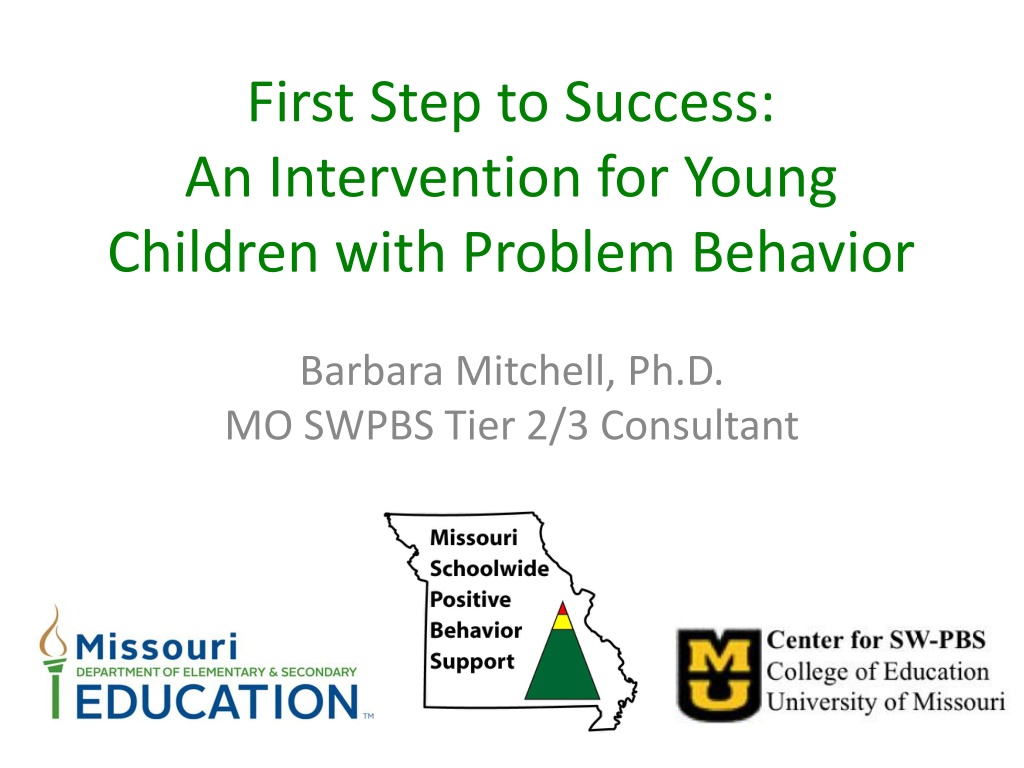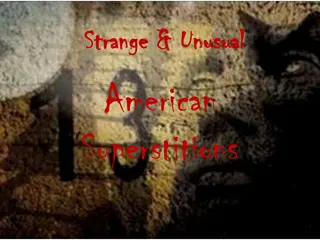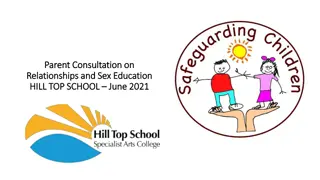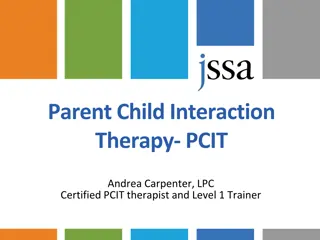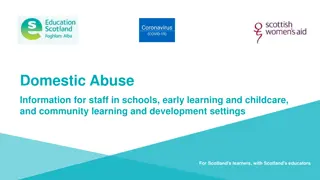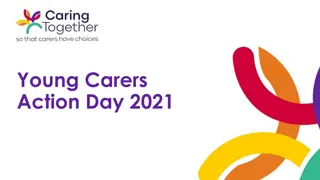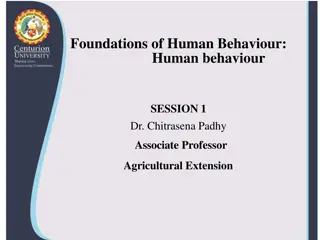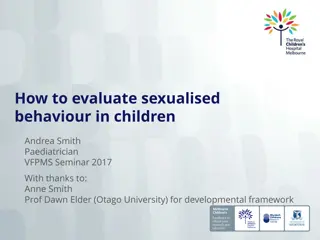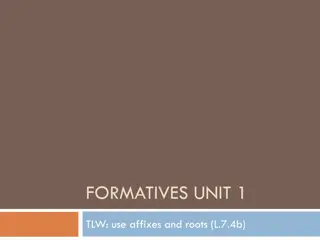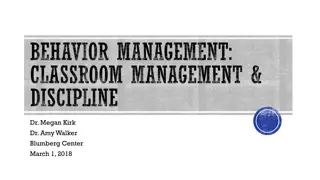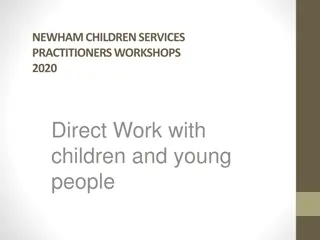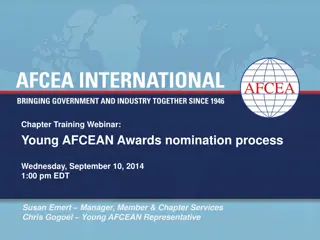Understanding Antisocial Behavior in Young Children
This intervention program by Barbara Mitchell, Ph.D., addresses the critical need for early intervention in children displaying antisocial behavior. It covers key components of the program, discusses examples of antisocial behavior, potential negative long-term outcomes, and emphasizes the importance of early intervention over punishment alone in educational settings.
Download Presentation

Please find below an Image/Link to download the presentation.
The content on the website is provided AS IS for your information and personal use only. It may not be sold, licensed, or shared on other websites without obtaining consent from the author. Download presentation by click this link. If you encounter any issues during the download, it is possible that the publisher has removed the file from their server.
E N D
Presentation Transcript
First Step to Success: An Intervention for Young Children with Problem Behavior Barbara Mitchell, Ph.D. MO SWPBS Tier 2/3 Consultant
Outcomes By the end of this session participants will be able to Explain the need for early intervention Describe components of the First Step to Success program Determine extent to which First Step may be a contextually appropriate intervention for staff and students in your setting. MO SW-PBS
Antisocial Behavior Consistent violation of behavioral expectations across a range of settings Home School Neighborhood Community (Walker et al., 1997) MO SW-PBS
Antisocial Behavior Examples include Physical aggression Tantrums Hostile reactions to social initiations from peers Defiance of adult directions Vandalism Disturbing and disrupting others Pestering & Over-activity (Walker et al., 1997) MO SW-PBS
What Do We Know? Children who begin school with antisocial behavior patterns are at great risk for a number of negative long-term outcomes School failure & dropout Delinquency Alcohol and drug use Adult criminality Dependence on welfare system Higher death and injury rates MO SW-PBS
Path to Negative Long-Term Outcomes for At-Risk Children & Youth
What Do We Know? By grade 4 antisocial behavior should be treated as a chronic condition like diabetes (not cured, but managed) 50% will maintain disorder to adulthood Life-course persistent antisocial behavior MO SW-PBS
What Do We Know? Punishment is not a solution Schools that use punishment alone as a primary tool have increased rates of Aggression Vandalism Truancy Dropout (Mayer & Sulzer-Azaroff, 1991) MO SW-PBS
What Do We Know? Early intervention in school, home and community is best hope for diverting from path of negative outcomes MO SW-PBS
Three Levels of Implementation A Continuum of Support for All Academic Systems Behavioral Systems Tier Three Individual Students Assessment-based Intense, durable procedures Tier Three Individual Students Assessment-based High Intensity Tier Two Some students (at-risk) High efficiency Rapid response Tier Two Some students (at-risk) High efficiency Rapid response Tier One All settings, all students Preventive, proactive Tier One All students Preventive, proactive MO SW-PBS
First Step to Success Helping Young Children Overcome Antisocial Behavior Walker, Golly, Severson, Kavanaugh, Stiller, & Feil, 1997 Sopris West
First Step Description Early intervention program designed to help children who are at risk for developing aggressive or antisocial behavioral patterns. Teaches students to get along with teachers and peers engage in schoolwork in an appropriate manner MO SW-PBS
First Step Research Two studies met the IES What Works Clearinghouse evidence standards Walker et al., 1998 & Walker et al., 2009 Evidence indicates First Step has Positive effects on externalizing behaviors Potentially positive effects on internalizing behavior, social outcomes, and academic performance behaviors (e.g., academic engaged time) MO SW-PBS
Implementation Guidelines Tier 2 intervention, targets students who already show signs of risk and/or maladaptive behavior Coach works with one child at a time in a classroom, but in the same fashion for all students who participate Enhanced version for students with intensive needs is being developed MO SW-PBS
Implementation Guidelines Appropriate for students PreK 3 Preschool Kit K-3 Kit Role of Coach is critical! Meant to be a positive support Careful monitoring and follow-up required Brief booster shots recommended MO SW-PBS
First Step Materials Implementation Guide homeBase Coach Guide Timer and stopwatch Overview video Lanyard to attach Green/Red cards Small Green/Red cards to take home Video tape Large Green/Red point cards for CLASS homeBase Parent Handbooks homeBase 3 parent bags homeBase Card Packs Parent help and activity cards Stickers, markers, pen, paper MO SW-PBS
First Step Roles & Responsibilities Coach Teacher Parents Student - Introduces program - Teaches acceptable behavior - Provides encouragement and recognition - Agrees to participate - Provides materials - Brings home green/red card - Provides encouragement and recognition - Participates in HomeBase meetings - Teaches behavior - Joins in HomeBase activities - Monitors student behavior - Practices skill building from HomeBase - Monitors progress - Phones parent - Leads homeBase MO SW-PBS
First Step Components Includes three interconnected modules: First Step Screening Identifies problems of antisocial behavior CLASS Contingencies for Learning Academic and Social Skills School intervention homeBase Home intervention Leverages key social agents Teacher and peers; Parents/Caregivers; Coach MO SW-PBS
Which Children Are At Risk? Externalizing Behaviors Aggression to others or things Hyperactivity Non-compliance Disruptive Arguing Defiance Stealing Not following directions Calling out MO SW-PBS
Which Children Are At Risk? Internalizing Behaviors Exhibits unusual sadness Sleeps a lot Is teased or bullied by peers Does not participate in games Very shy or timid Acts fearful Does not stand up for self Withdrawn Avoids social interactions MO SW-PBS
Early Detection - Screen Designed to identify children with elevated risk for developing antisocial behavior patterns Screening options 1. Teacher nominations and rankings 2. Teacher nomination and ranking followed by teacher ratings using a 9-item scale 3. Teacher nomination and rankings; Teacher and parent ratings; and direct observations (Early Screening Project; ESP) MO SW-PBS
School Intervention - CLASS Classroom Teacher First Step Coach Parents/C aregiver First Step Student MO SW-PBS
School Intervention - CLASS Provided within a regular classroom context Requires a minimum of 30 program days for successful completion Each program day has performance criterion that must be met before proceeding to next day of program If criterion isn t met the program day is repeated (recycled) MO SW-PBS
General Procedures - CLASS Large green/red card is used to cue student Green = keep doing what you re doing Red = stop; think about what you need to do Feedback and points are awarded for specified intervals (stopwatch) 80% or more of opportunities scored green gets class reward e.g., 5 min extra recess, popcorn MO SW-PBS
General Procedures - CLASS Coach/Teacher contacts home daily to report on student progress Child takes green/red card with recorded score home each night Parent rewards child or provides encouragement for meeting goal the next day; signs card and returns it to school MO SW-PBS
Procedures Coach Phase - CLASS Coach Teacher Parents Days 1- 5 -Implements program with child in classroom -Provides verbal praise -Check for green/red card each day -Announces incentive to class -Gives praise and incentive for making daily points -Communicates with parents daily -Supports delivery of incentive -Completes green/red card; determines if goal is met -Remains neutral if child doesn t make daily points -Supports green/red card going home -Signs card and returns it to school. MO SW-PBS
Procedures Teacher Phase - CLASS Coach Teacher Parents Days 6- 30 -Implements weekly homeBase program; 6 sessions -Takes over daily intervention implementation -Participates in weekly homeBase program with coach -Records information on monitoring form -Participates in daily homeBase activities w/ child -Provides support and consultation to teacher -Communicates daily with parents -Provides praise, incentives, and monitors green/red card MO SW-PBS
Maintenance Phase - CLASS Coach Teacher Parents Days 31 and Beyond -Continues homeBase program -Works with Coach to maintain positive gains -Continues homeBase program -Monitors child s progress -Works with Teacher to maintain positive gains -Maintains communication with Parents -Provides consultation to teacher -Collects post intervention data MO SW-PBS
School to Home Link - homeBase Coach meets with family for 6 weeks 45-60 min per week Provides lessons for promoting school success Parents work with child 10-15 min per day Skill building and practice; positive interactions Parent uses help & activity cards MO SW-PBS
School to Home Link - homeBase Communicating and sharing school Cooperation Setting Limits Solving Problems Making Friends Developing Confidence MO SW-PBS
Parent Lesson - homeBase MO SW-PBS
Parent Help Card - homeBase MO SW-PBS
Parent Activity Card homeBase MO SW-PBS
Parent Activity Card homeBase MO SW-PBS
First Step Components Although the intervention components can stand alone and be used singly and independently, it is highly recommended that they be used in concert. The First Step program has maximal impact when implemented in this fashion. *Screen CLASS - homeBase (Walker et al., 1997, p. 3) MO SW-PBS
Barriers to Effective Implementation Lack of stakeholder commitment Concerns about screening children Objections to utilizing rewards Parent Support Constraints of school/class schedules Needs to occur daily Limited resources Coach, Time, Materials 50-60 hours over 3 months; $500 per student MO SW-PBS
Resources Missouri PBIS Website, Session 8B http://pbismissouri.org/archives/3483 Intervention Overview Coach, Teacher, and Parent Roles *Documents provide a written description of the First Step intervention and key implementation responsibilities. MO SW-PBS
Resources First Step to Success Information http://www.firststeptosuccess.org What Works Clearinghouse http://ies.ed.gov/ncee/wwc/interventionreport.aspx? sid=179 OSEP Technical Assistance Center of PBIS http://www.pbis.org/research/secondary/first_steps_ to_success.aspx MO SW-PBS
Resources Purchase First Step to Success Materials Preschool Edition Starter Kit - $178 Re-supply - $60 School-Age Edition Starter Kit - $204 Re-supply - $50 http://store.cambiumlearning.com/first-step- to-success/ MO SW-PBS
Resources First Step to Success Training Sessions Two-day workshop (fall and spring) October 17 or 30 April 23 or 24 Jefferson City Register through South Central & Heart of Missouri RPDC MO SW-PBS
Contact Information RPDC Regional and/or Tier 2/3 SWPBS Consultant Barb Mitchell, Tier 2/3 SWPBS Consultant mitchellbs@missouri.edu MO SW-PBS
